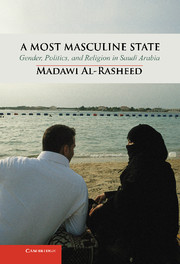Book contents
- Frontmatter
- Contents
- Acknowledgments
- Introduction
- 1 From Religious Revival to Religious Nationalism
- 2 Schooling Women
- 3 Symbols of Piety
- 4 The Quest for Cosmopolitan Modernity
- 5 Women in Search of Themselves
- 6 Celebrity Women Novelists and the Cosmopolitan Fantasy
- 7 Guarding Self and Nation
- Conclusion
- Glossary
- Bibliography
- Index
- References
2 - Schooling Women
The State as Benevolent Educator
Published online by Cambridge University Press: 05 February 2013
- Frontmatter
- Contents
- Acknowledgments
- Introduction
- 1 From Religious Revival to Religious Nationalism
- 2 Schooling Women
- 3 Symbols of Piety
- 4 The Quest for Cosmopolitan Modernity
- 5 Women in Search of Themselves
- 6 Celebrity Women Novelists and the Cosmopolitan Fantasy
- 7 Guarding Self and Nation
- Conclusion
- Glossary
- Bibliography
- Index
- References
Summary
The government of Saudi Arabia has always recognised the importance of providing educational opportunities to girls as well as boys.
Ministry of Education, Saudi ArabiaWhile Wahhabi religious nationalism insisted on a return to authentic Islamic tradition, the state endeavoured to project itself as an agent of modernisation. Schooling girls in Saudi Arabia became one of the state's most publicised achievements. The education narrative combines important, appealing dimensions. Schooling girls projects the state as a progressive and modern development agency. The narrative asserts that the state was committed to the education of girls amidst fierce social and religious opposition from the ideologues of religious nationalism. To resolve the contradiction, the state introduced education while remaining faithful to religious nationalism. This was achieved when the state put girls’ education under the authority of religious scholars. Consequently, education became the most important instrument of religious nationalism, homogenising the nation and guarding its piety. When it introduced the first school, the state claimed that it did not deviate from the principles of religious nationalism, thus reflecting the impossible task of combining modernisation with traditionalism, often expressed in the idiom of ‘modernisation within an Islamic framework’ or ‘modernisation while remaining faithful to the principles of Islam’. The education of girls had to be put under the guidance of the religious scholars in order to remain within the parameters of reproducing the pious nation and confirming women in their traditional roles.
The state's education narrative highlights the role of two kings, Saud (r. 1952–64) and Faisal (r. 1964–75), with the latter assuming all the credit for a revolutionary step in a ‘conservative’ society. In particular, Faisal's wife, Iffat, is singled out as the mind behind the initiative of extending education to girls. This narrative ignores the calls of writers, columnists, essayists, and literary figures – especially those in the Hijaz, who as early as the 1920s had called for the schooling of girls. The education of girls had not been as alien to society as is often assumed in the process of highlighting the role of the state as educator.
- Type
- Chapter
- Information
- A Most Masculine StateGender, Politics and Religion in Saudi Arabia, pp. 77 - 107Publisher: Cambridge University PressPrint publication year: 2013



